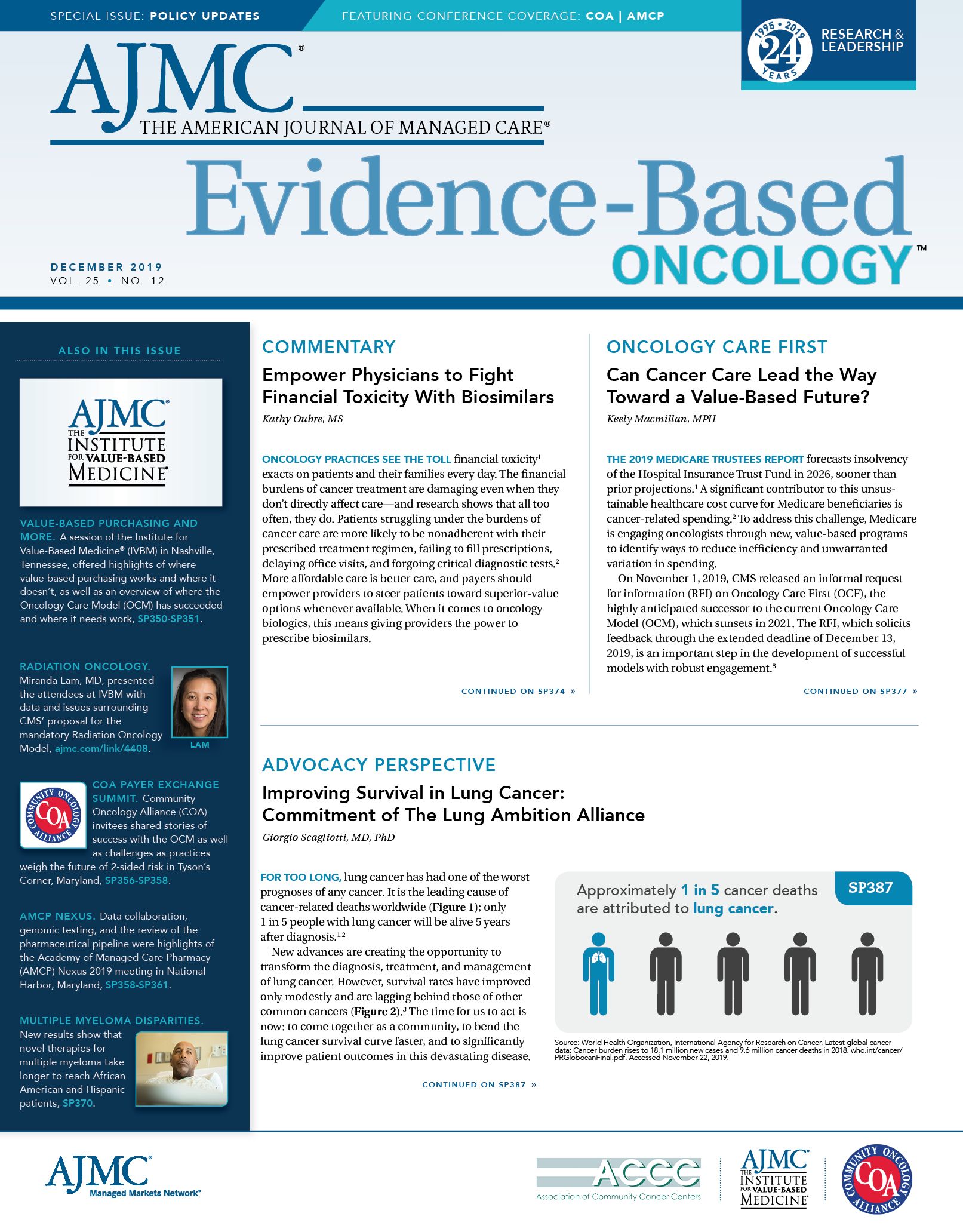- Center on Health Equity & Access
- Clinical
- Health Care Cost
- Health Care Delivery
- Insurance
- Policy
- Technology
- Value-Based Care
From the Editor-in-Chief: Lead, Follow, or Get Out of the Way
Dr Alvarnas is editor-in-chief of Evidence-Based Oncology.™ He is vice president of Government Affairs, senior medical director for Employer Strategy, and associate clinical professor, Hematology & Hematologic Cell Transplantation, City of Hope, Duarte, Califonia.
In 2018, The FDA approved 19 drugs, 4 biosimilars, and added 38 indications for therapies that fight cancer.1
The pace continued in 2019: of the 41 new agents approved through November, 15 are used in cancer or blood disorders.2 This period of innovation is likely to continue, and even accelerate, due to the FDA’s willingness to examine real world data and alternative approval endpoints, 1 off ering evidence that research focused on rare cancers, or improving outcomes and reducing toxicities, is having an impact.3
However, innovation has come at a price. In 2018 spending on cancer medicines rose by 12.9%,3 while the overall US infl ation rate was only 1.9%.4 Controlling healthcare costs dominates nearly all other considerations in the political debate over healthcare reform. For federal policymakers, ensuring the sustainability of the Medicare Trust Fund is central to all considerations for future CMS care and reimbursement models.5 These concerns have delayed CMS’ development of reimbursement models for emerging cancer treatment technologies, such as chimeric antigen receptor (CAR) T-cells.
Fears about the Medicare Trust Fund and healthcare related infl ation have propelled CMS leadership to increase the level of risk that clinicians and healthcare systems bear in care delivery. The inclusion of advanced alternative payment models (APMs) within the Medicare Access and CHIP Reauthorization Act of 2015 show the importance of bringing greater cost accountability and transparency to physicians and healthcare systems.6
Unfortunately, this adds administrative burdens and ironically hold physicians accountable not only for the costs that they can control, but also for those they cannot control, such as the proper use of high-cost pharmaceuticals.. Thus, physicians and healthcare systems are disempowered from leading meaning, sustainable innovation efforts and have at best highly imperfect models through which they can follow the lead of the agency.
In this issue of Evidence-Based Oncology™ we examine this issue from multiple perspectives. Kathy Oubre, MS, provides perspective on biosimilars that may provide an innovative paradigm for blunting the cancer pharmaceutical rate of inflation. Keely Macmillan, MPH, provides an overview of the proposed Oncology Care First (OCF) model and how it may or may not lead to better incentives for physicians to practice value-based cancer care. Finally, Associate Editor Kashyap Patel, MD, provides one of 2 physician perspectives on the OCF model.
We must not forget that physicians and healthcare systems that actually provide care to patients are essential incubators for transformational ideas that bring us closer to realizing the full potential of the value-based cancer care paradigm. For physicians and cancer care systems to lead this transformation, they need to be allowed to lead and innovate in an unfettered way. Alternative APMs must give physicians fl exibility to succeed in the pursuit of economically sustainable care excellence.
Physicians should never be penalized for delivering the most appropriate care to their patients, even if it is more expensive. The future of increasing eff ective cancer care that better serves patients and their families is dependent upon ensuring that physician and healthcare system leaders are allowed to move forward, at speed and empowered to succeed in making this future a reality. References
1. Dietz C, Bin Han Ong M. FDA approves 19 new cancer drugs and biologics in 2018—and don’t forget two new endpoints and “real-time” review. The Cancer Letter. cancerletter.com/articles/20190125_2/. Published January 25, 2019. Accessed November 30, 2019.
2. US Food and Drug Administration. Novel drug approvals for 2019. www.fda.gov/drugs/new-drugs-fda-cders-new-molecular-entities-and-new-therapeutic-biological-products/novel-drug-approvals-2019. Accessed November 30, 2019.
3. IQVIA Institute for Human Data Science. Global Trends 2019. iqvia.com/-/media/iqvia/pdfs/institute-reports/global-oncology-trends-2019.pdf?_=1575154005513. Published May 2019. Accessed November 30, 2019.
4. US Inflation Calculator. Current US inflation rates: 2009-2019. usinflationcalculator.com/inflation/current-inflation-rates/. Accessed November 30, 2019.
5. Cubanski J, Neuman T, Freed M. The facts on Medicare spending and financing. Kaiser Family Foundation.. kff.org/medicare/issue-brief/the-facts-on-medicare-spending-and-financing/. Published August 20, 2019. Accessed November 30, 2019.
6. Medicare Access and CHIP Reauthorization Act of 2015, HR 2, 114th Cong, 1st Sess, (2015).

Ambient AI Tool Adoption in US Hospitals and Associated Factors
January 27th 2026Nearly two-thirds of hospitals using Epic have adopted ambient artificial intelligence (AI), with higher uptake among larger, not-for-profit hospitals and those with higher workload and stronger financial performance.
Read More
Exploring Racial, Ethnic Disparities in Cancer Care Prior Authorization Decisions
October 24th 2024On this episode of Managed Care Cast, we're talking with the author of a study published in the October 2024 issue of The American Journal of Managed Care® that explored prior authorization decisions in cancer care by race and ethnicity for commercially insured patients.
Listen
Motivating and Enabling Factors Supporting Targeted Improvements to Hospital-SNF Transitions
January 26th 2026Skilled nursing facilities (SNFs) with a high volume of referred patients with Alzheimer disease and related dementias may work harder to manage care transitions with less availability of resources that enable high-quality handoffs.
Read More

